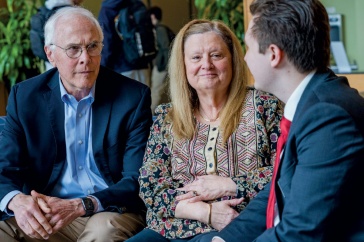The University of New Hampshire has received a $1.8 million National Professional Development grant from the U.S. Department of Education's Office of English Language Acquisition to increase the academic achievement of English learners in the Nashua public schools, particularly in math and science.
“These funds will help upgrade the content and instructional skills of new and veteran teachers working with English learners, as well as provide career ladder programs for paraprofessionals,” said Rosalinda Barrera, assistant deputy secretary and director of the Office of English Language Acquisition. “It’s critical for our English learners to have access to high-quality instruction in all subjects that will prepare them for success in college, the workplace and our global economy.”
The five-year grant will fund “GATE CITY: Getting All Teachers ESOL Certified in Two+ Years,” a program designed to increase the number of grade-level teachers in Nashua, particularly in the science, technology, engineering, and mathematics (STEM) content areas, who have English to Speakers of Other Languages (ESOL) certification. The grant also will allow UNH to collaborate closely with the Nashua School District administration to develop an effective system for ensuring that professional development activities for teachers of English language learners are evaluated through a critical lens that promotes best practices and increases student achievement.
“The Nashua School District is extremely excited to partner with UNH on the five-year grant. The district has seen a 28 percent increase in students actively receiving English language learner services in the last five years. As Nashua’s diversity increases, it’s imperative that our teachers have the instructional skills to educate the children in our schools,” said Robert Cioppa, coordinator of the Nashua School District English Language Learner (ELL) program.
Currently, 53 languages are spoken by students in the Nashua School District, with Spanish second only to English. Students hail from 80 different countries, including the Dominican Republic, Brazil, India, Puerto Rico, and Mexico.
“The Nashua School District has chosen to focus on STEM because the district has focused on literacy instruction for a number of years. While the literacy focus has been effective, the district recognizes that science and math are identified areas of improvement for our students. As teachers gain more instructional strategies, we expect to see a marked improvement in student performance,” Cioppa said.
According to project director Judy Sharkey, associate professor and associate director of teacher education at UNH, the university plans to offer an on-site program in Nashua that will allow 80 teachers and educational professionals to earn their ESOL certification, with the priority on STEM content teachers. In addition to providing this professional development to teachers and schools, UNH also will work closely with researchers at Kansas State University to examine how the professional development is affecting teacher practices and student learning.
UNH has a strong track record of providing ESOL training, which includes both professional development and community involvement. The university just completed the five-year project “ELL Co-op: The English Language Learning and Teaching Professional Development Cooperative of New Hampshire,” which Sharkey also directed, produced more than 40 ESOL-certified teachers plus provided on-site professional development to hundreds of teachers and education professionals in the state. The program was funded with a five-year, $1.3 million National Professional Development grant from the U.S. Department of Education's Office of English Language Acquisition that UNH received in 2007.
“Our graduates and the schools that hire our students identify the community-based nature of our ESOL program as a key strength. All of UNH’s English language learner courses have strong community field experiences because we believe that teachers need to understand and appreciate the communities in which schools are located. Building healthy relationships is the heart of teaching and learning, and to do that, teachers need to go outside of the school buildings and spend quality time in the communities they are going to serve,” Sharkey said.
“So in addition to developing curriculum, designing lesson plans, and exploring multiple ways to engage and assess learners, our students also conduct community investigations, home visits, and interviews with community organizers and leaders, and work with community agencies such as Child Health Services and the International Institute to design and implement out-of-school programs for immigrant and refugee youth and families,” she said.
Cioppa said having more mainstream teachers certified to teach English language learners means more teachers will have the ability to effectively instruct more students from diverse backgrounds. District officials also believe that strategies used to instruct English language learners will also help with instructing students who traditionally struggle in academics.
“As teachers learn more instructional strategies, they will be better able to reach more students in their classes and become highly effective teachers As research has shown, highly effective teachers impact student performance more than any other predictor,” Cioppa said.
-
Written By:
Lori Tyler Gula, PhD | NH Agricultural Experiment Station | lori.gula@unh.edu | 603-862-1452
















































